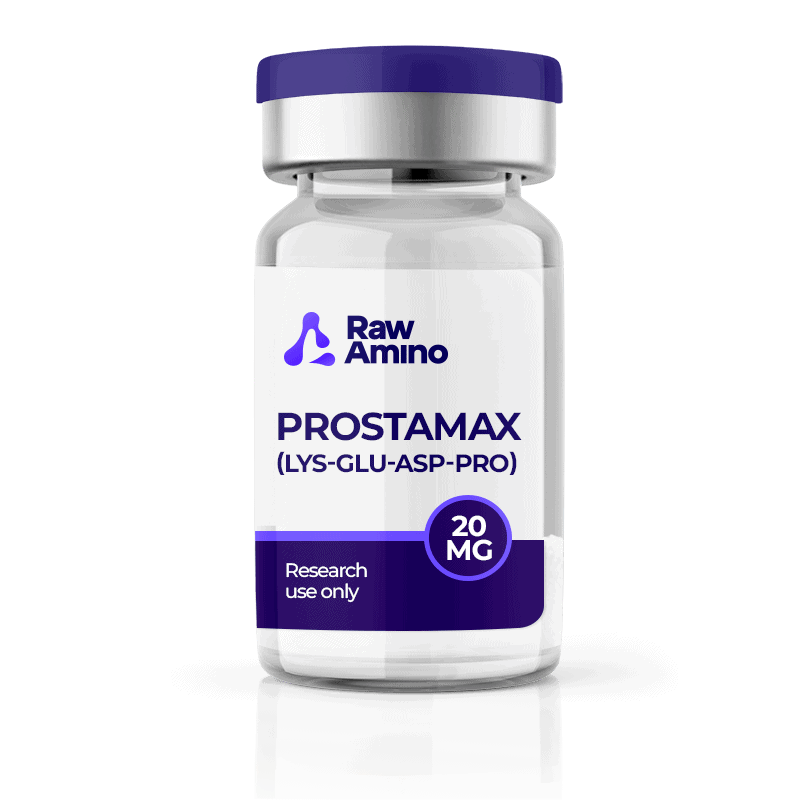
Prostamax – 20MG
$60.00
Discount per Quantity
| Quantity | Discount | Price |
|---|---|---|
| 5 - 8 | 5% | $57.00 |
| 9 + | 10% | $54.00 |
Scientific Overview of Prostamax
Prostamax, also known as KEDP, is a synthetic tetrapeptide from the class of short regulatory peptides. It has been explored in research models for its potential influences on chromatin structure and transcriptional regulation, particularly in studies involving lymphocytes and prostatic tissue cultures. Investigations suggest it may be connected to structural rearrangements of chromatin fibers, with possible implications for gene expression and cellular activity in aging and tissue repair contexts.
Prostamax Studies and Research Data
Findings on Prostate Tissue Models
Research using prostatic tissue cultures suggests Prostamax may play a role in processes associated with cellular maintenance. Experimental work in organotypic models indicated that Prostamax could be linked to stimulatory responses in both younger and older tissues. Other investigations in murine models proposed a potential reduction in inflammatory changes and alterations in stromal characteristics, with additional speculation that Prostamax may contribute to limiting degenerative processes within the prostate.
Prostamax Investigations of Chromatin Modulation
A body of studies has proposed that Prostamax may influence the organization of chromatin in cultured lymphocytes. Reports describe potential decondensation of heterochromatin regions, redistribution of structural components, and selective modifications of chromosome segments. In particular, chromosomes 1 and 9 have been highlighted as possible sites where Prostamax may contribute to chromatin restructuring. Such modifications have been interpreted as linked to transcriptional reactivation of regions typically silenced during cellular aging.
Research on Gene Activity and Chromosomal Markers
Experimental evidence suggests Prostamax may be associated with an increase in sister chromatid exchanges and nucleolus organizer region activity. These changes appear to correspond with shifts in ribosomal RNA gene expression and a loosening of compacted chromatin domains. Some studies further propose that Prostamax might facilitate gene reactivation processes tied to age-related chromatin condensation, although the precise molecular mechanisms remain to be clarified.
Prostamax Explorations in Cellular Aging
In aging research, Prostamax has been examined alongside other regulatory peptides for its possible role in counteracting chromatin condensation observed in senescent models. Reports describe a trend toward relaxation of condensed chromatin fibers and a release of transcriptionally repressed regions. These findings suggest Prostamax may contribute to maintaining more open chromatin states in older cells, supporting hypotheses of its relevance in age-associated transcriptional changes.
Conclusion
Prostamax research has primarily focused on its potential interactions with chromatin structure, transcriptional dynamics, and prostate tissue models. Findings suggest possible roles in gene reactivation, chromatin decondensation, and tissue-level processes of structural maintenance. While these investigations point toward interesting biological pathways, further study is necessary to fully understand its scientific significance.
References
- Khavinson VKh, Lezhava TA, Malinin VV. Effects of short peptides on lymphocyte chromatin in senile subjects. Bull Exp Biol Med. 2004;137(1):78–81. doi:10.1023/b:bebm.0000024393.40560.05. PMID: 15085253
- Borovskaya TG, Pakhomova AV, Vychuzhanina AV, Poluektova ME, Fomina TI, Ermolaeva LA, … Neplochov EA. Experimental studying of the drug efficiency Prostamax in the therapy of chronic aseptic prostatitis and its complications. Modern Research in Inflammation. 2013.
- Zakutskiĭ AN, Chalisova NI, Ryzhak GA, Aniskina AI, Filippov SV, Zeziulin PN. [The tissue-specific effect of synthetic peptides-biologic regulators in organotypic tissues culture in young and old rats]. Adv Gerontol. 2006;19:93–6. PMID: 17152728
- Meskhi T, Khachidze D, Barbakadze Sh, Madzhagaladze G, Gorgoshidze M, Monaselidze D, Lezhava T, Tadumadze N. Vliianie peptidnogo bioreguliatora prostamaksa na geterokhromatin limfotsitov cheloveka in situ [The influence of the peptide bioregulator prostamax on heterochromatin of human lymphocytes in situ]. Biofizika. 2004;49(6):1091–3. PMID: 15612551
- Dzhokhadze TA, Buadze TZh, Gaĭozishvili MN, Baratashvili NA, Lezhava TA. [Deheterochromatinization of the chromatin in old age induced by oligopeptide bioregulator (Lys-Glu-Asp-Pro)]. Georgian Med News. 2012;(212):76–82. PMID: 23221144
Disclaimer:
The products mentioned are intended solely for laboratory research and in-vitro experimentation. They are not approved for human or animal use of any kind. All details provided are for educational purposes only. By purchasing from this site, you agree to comply with our Terms and Conditions.
10 reviews for Prostamax – 20MG
Only logged in customers may leave a review.
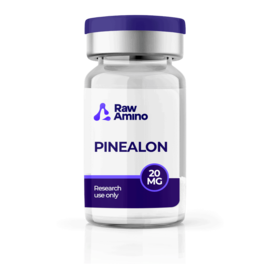
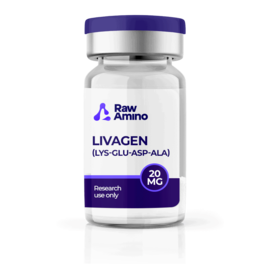
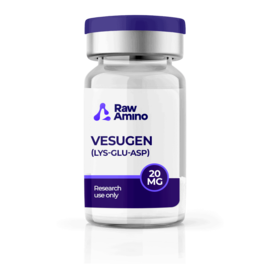
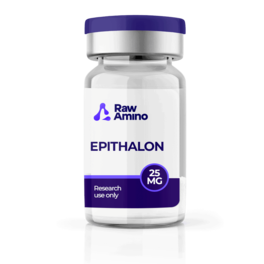
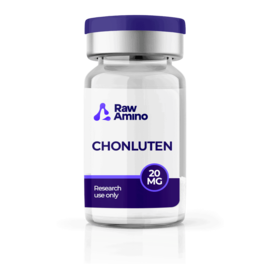
proto46k –
GREAT OVERALL 5 STARS!
daniellesavage –
tina8396 –
matthew_hayden –
strong stuff!
ewyatt –
alex1748 –
ronald770 –
javier_valenzuela –
rpope –
susan6783 –